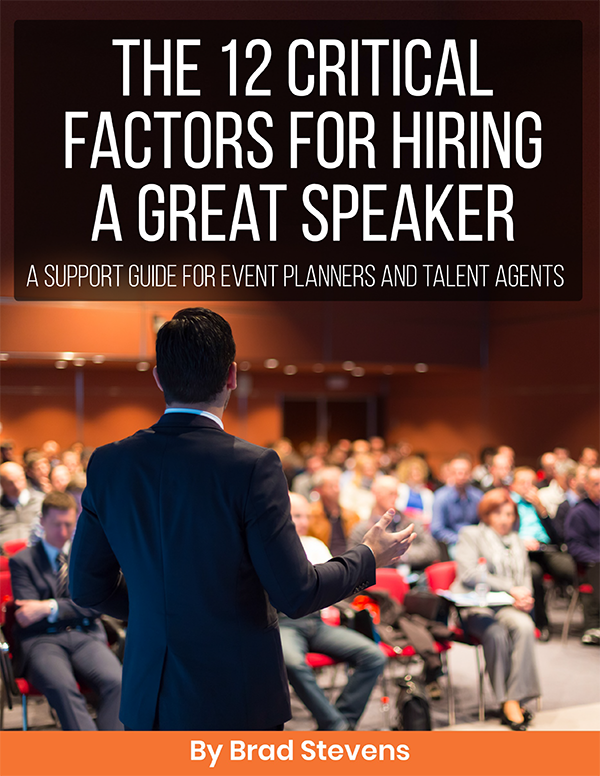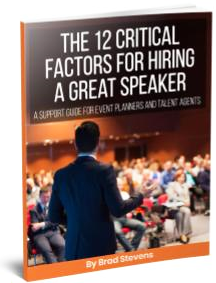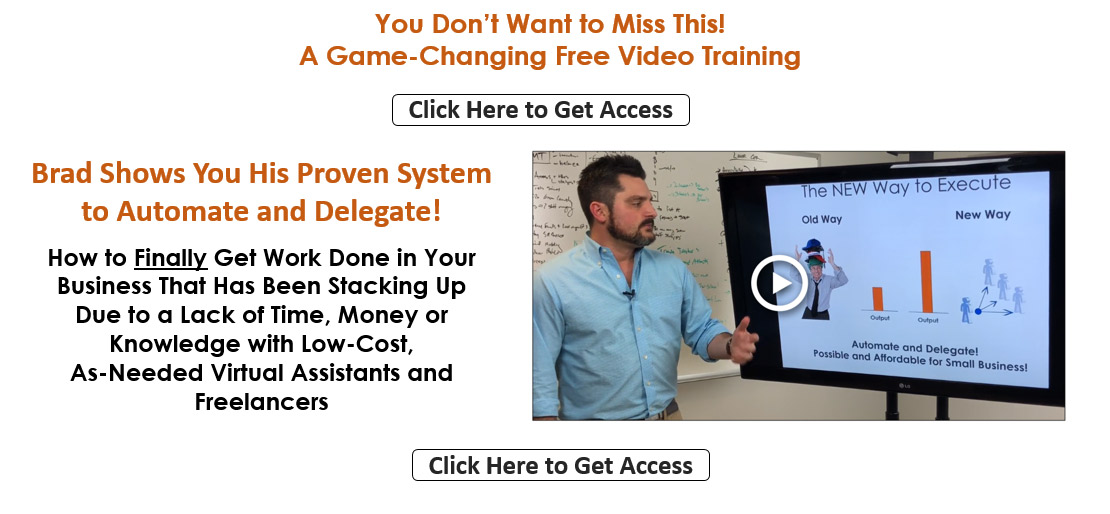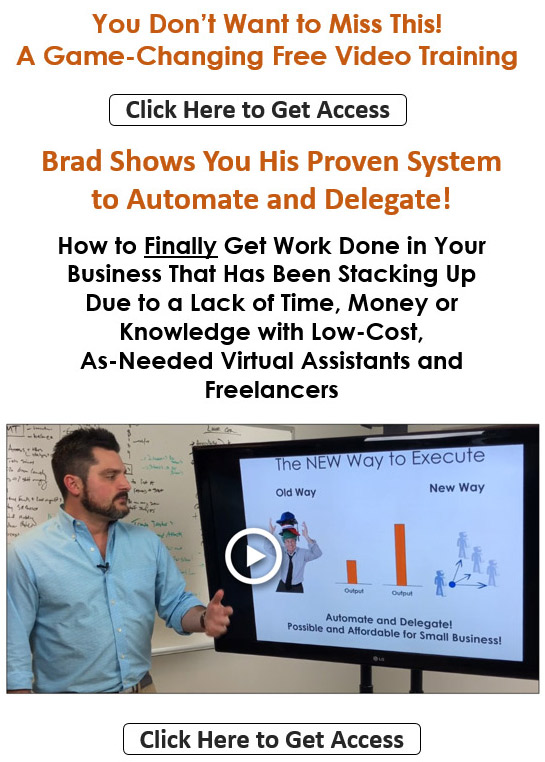
In a fast-paced world filled with tons of technology and less personal interactions the opportunity to physically and verbally communicate with people is rare, but more important than ever before.
Over the last 20 years I have been on the board of many business and non-profit organizations and have had the unique position to evaluate over 150 speakers, as part of creating a learning calendar, full of high-impact speakers that deliver value.
I have also had the honor to work with many amazing event planners while speaking at events with various audiences ranging from budding entrepreneurs to Fortune 500 business executives.
What does that mean for you? In this guide, I will give you a perspective from both an event planner myself and as an experienced speaker.
I have studied what differentiates an average speaker from a phenomenal one as well as exactly what event planners are looking for (and expect) to make their next event a true success. I am constantly learning and seeking feedback as there are always opportunities to improve by speaking with event planners before and after events along with studying and taking notes while watching other speakers.
From the body language they use to captivate an audience, to the types of visuals you should leverage, and even down to the engagement strategies they use to connect with each person in the room – I’ve studied it all!.
From my experience, here are the 12 critical factors event planners carefully consider when they evaluate speakers for their high profile events.
1. How well do you listen?
Being a powerful and effective speaker on stage is one thing, however, being professional and easy to work with is often another. Though a speaker may have an impactful message or a dynamic delivery, how easy (or hard) it is to communicate with them leading up to the event is important to consider. Did they take the time to understand the theme or purpose of the event? Have they asked about your expectations? Are they invested in taking the time to make sure their speech will fit your audience and be a success? These are all questions to consider that go well beyond the speaker’s content and/or their overall reputation.
For example, recently I was asked to speak at an entrepreneurial organization in Washington, DC that had an event theme of “Think Differently.” Although my presentation included a lot of applicable material and strategies that fit well with this theme, I made sure to add in specific phrases and new information throughout my speech that would directly address this theme.
2. Do you have true credibility?
Event planners will delve deep into your background and your track record to see if you have the expertise needed to deliver. They will considering questions like: Do they practice what they preach? Are they published? Do they have an established online presence? This due diligence step is key for event planners, as event attendees will likely search the internet to learn more about the speaker and it is valuable if your work is available online as proof of your expertise.
I’ve written dozens of published articles and I often write an article after many of my speaking engagements to highlight any new material I’ve used or to share additional insights with other business leaders. In fact, one of the funnier slides that I have used in a presentation was based on an Inc magazine article I wrote called “I Would Outsource Brushing My Teeth If I Could.” This was a great way for me to bring my real-world credibility into my presentation and gave me an opportunity to earn credibility by showing that I truly practice what I preach.

3. What is your speaking track record?
Credibility is one element, but it is vital to have the credentials and experience to back it up. Event planners will ask for recommendations or may want to speak with prior event hosts who have worked with you to get an insider’s view of how your speech went and your overall process. If you have testimonials be sure to share those (even have them posted on your website), but it is also good to have at least 2 previous clients that event planners can call to get more direct and targeted feedback about your speaking abilities.
4. Do you have a highlight reel and do you have promotional videos or material to help promote you at the event?
Many speakers have highlight reels, depicting the best 5-10 speech snippets, usually woven together into a nice promotional video. Keep in mind, these highlight reels should showcase your best speeches. You want to always have an extended speech sample available that is at least 5-10 minutes in length for you to give event planners a better feel for your delivery style, speed, volume, crowd engagement, etc.
Also, provide promotional videos, content, photos, pre-made social media posts, landing pages or other resources to make it turn-key for them to promote you as a speaker for their event. This is something I found event coordinators absolutely love so we developed a dedicated page with all of our support resources easily accessible and a short video explaining each of them. It’s a win-win for the speaker and the coordinator!
5. Are you demanding unrealistic accommodations?
Simply put… event planners will want to see if you are a pain in the ass to work with? If you’re requiring only green M&Ms and fresh goat milk in your waiting room, then event planners will likely take this as a sign that you may be too “high maintenance.” Many speakers get caught up in their own high-end travel needs, that they may request specific (and often odd) requirements before they agree to take a speaking engagement.
6. Do you have a clear idea of how you will engage the audience?
It is always good practice to know what you want the audience to take away from your speech. Knowing the end objective or the outcome of where you want to take the audience is important for the event planner to know in order to determine if you are the right speaker for their event. As often as possible, reflect and truly ask yourself, “Do I have a clear idea of the journey I am taking the user on or am I just pushing out information?” This is where taking the time to understand your audience is important to ensure that what you present is both relevant and engaging to the event attendees.

7. Is your content easy to understand?
Again, this goes back to you being a speaker that is willing and invested in learning about the audience. For an event planner, there is nothing worse than hiring a speaker and having the content they present either confuse or completely go over the head of the audience. If you are able to provide an outline of the speech beforehand this is great and highly recommended for the event planner to review and provide feedback, if necessary.
8. Can you make the audience feel something?
As Maya Angelou says, “people will forget what you said, and people will forget what you did, but they will never forget how you made them feel.” Regardless of the type of event, whether it will be to talk about tax planning or as part of a larger motivational event, you should know how to get the audience to feel during the experience. Providing content is only a small part of the success of a speaking engagement, instead, the effectiveness is much more rooted in evoking a feeling within the audience and giving them actionable items they can use.
9. What’s your energy level?
Part of a speaker’s job is to translate energy into the room and to the participants. This does not mean that you have to be super energetic and bouncing off of the walls, but you should be able to command a presence on the stage that captivates the audience. I use the phrase connected energy because that is what it’s about. It is about having energy, but, more importantly, about truly connecting with the audience by moving around and looking into people’s eyes as you deliver content. I am a very high energy individual, and when I first started speaking, I thought the more energy I could bring, the better – but, this wasn’t always true. I learned, over time, that I had to throttle that energy up-and-down to create more texture for the experience for the audience.
10. How will you interact and engage with the audience?
So many speakers get caught up in pushing their content out that they don’t pull the audience in to engage in the experience. From my research and personal experience, I’ve found that the speakers with the highest ratings tend to have some element of interaction. This is particularly true if they are doing a workshop, then they may have a high-quality workbook that participants can use during the speech. Having short and impactful videos are also a great way to mix up the experience. In addition, offering a polling feature throughout the speech is an innovative way to get the audience interacting and responding in real-time to the speaker’s content. When I do workshops we have a very specific worksheet I use that gives my content a much deeper impact. I also leverage technology such as a software called “Poll Anywhere” that enables participants to respond via their mobile device as I pose questions throughout my speech. It is little things like this that makes the audience feel more connected to you as the speaker and more willing to receive the content and improves retention.
11. How do you balance body language versus content?
The statistics show that communication is 80% about your body language and the way you connect physically with the audience rather than based solely on the content. Amazing speakers can deliver even the most “boring” topics in such a way that instantly moves an audience. When you’re preparing your highlight reels and speaker samples really be sure that they showcase your body language, including your posture, how you emphasize points, how well you connect with the audience, always providing consistent eye contact. Also, incorporating meaningful pauses throughout the delivery is key to allow time for key points to sink in and for the pacing of the speech to not feel rushed or forced.

12. What types of visuals do you use?
Many speakers put audiences through what I call “PowerPoint Hell.” When contacted by event planners, have a sample of your slide deck or even 5-8 slides ready (if you cannot share the entire presentation) will do fine. When viewing your slides, event planners will look at the spacing, the types of images used, the amount of text on each slide, the readability, etc. The more visuals you can leverage, the better! You will lose an audience in a heartbeat and get horrible ratings if it is just a bunch of dense text that they are reading. Also, be sure you do not read the text word for word. The visuals should supplement the speech and be used effectively to emphasize points or progress the audience through the content. I recently attended an event where a speaker from a national bank literally had every square inch of space on all the slides jammed with text. Half the audience was nearly sleeping halfway through!
BONUS: The Day After…
Effective and highly reputable speakers will make themselves readily available before and after the event. I personally reach out to clients and ask for their honest feedback as well as asking them for any audience-specific feedback that I can use to improve my presentation and delivery.
I often, immediately after a presentation, make a ton of notes for myself of things that I can do to improve the content from what I’ve heard how the audience reacted and how I felt on stage.
Hopefully this has been helpful to give you additional “filters” to consider when positioning yourself as a reputable speaker.
You may find as you interact with various event planners that there are more filters to add to this list and I would love to hear your feedback for our next edition!
If you’re looking to grow as a speaker or your brand or get more speaking engagements we have an entire system to help with solutions you might not expect. “HINT” We use low cost virtual assistants and freelancers all over the world for $4 to $7 an hour to do all our social media, find speaking opportunities, run digital marketing, and more. Here’s a full FREE on-demand video workshop I did showing how I built and use my virtual team to automate and delegate.
To learn more about Brad Stevens Training visit: www.bradstevenstraining.com
————————
Here’s one of my favorite blogs that you may enjoy:
Speakers have to be a content producing machine. How to do it fast and low-cost.
I hope you enjoyed this guide! I look forward to hearing about your new speaking opportunities!
Take Care!
Brad Stevens and the BST Team
Brad Stevens Biography
Brad Stevens is a lifetime entrepreneur and is the CEO of Brad Stevens Training, an international education and advisory organization focused on growth, innovation and balance to help entrepreneurs and small businesses survive and thrive across all dimensions of their company and personal life.
As a lifetime entrepreneur, Brad has helped build multiple 7 figure businesses in domestic and international markets. He uses innovative growth strategies to build new companies and his organization teaches other entrepreneurs how to leverage these techniques.

His company publishes the Top 200 Tools to Fuel Business Growth. For his work with startups to $100 million firms, he has been featured in Inc Magazine 3 times, the EO Global Innovation Forum, the Wall Street Business Network and was featured on the cover of Small Business Magazine. His is also a recipient of the Top 40 Most Innovative Businesses award
He has become one of the nation’s top advisors and keynote speakers for global firms, CEO peer groups, universities, and top-ranked business organizations including EO, YPO, SCORE, Vistage, TAB, and the CEO Brain Trust.
He is also on the local and regional board of EO Atlanta and Startup Atlanta. He lives in Sand Springs, GA with his 3 year old daughter Ella and wife Cindy, an inspirational third grade teacher.



